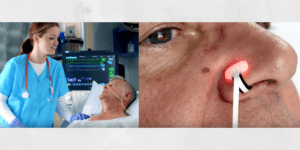NHS Improvement on Placement of SpO2 Sensors
NHS Improvement on Inappropriate Placement of SpO2 Sensors

NHS Improvement have recently issued a Patient Safety Alert, citing a risk of harm from inappropriate placement of pulse oximeter/SpO2 probes. You can see the full alert by clicking the following link:
NHS Improvement on Inappropriate Placement of SpO2 Sensors
We know how inappropriate probe placement will affect saturation readings and compromise patient safety. The NHS Improvement Patient Safety Alert specifically mentions finger probes and ear probes, but the principals highlighted are relevant for all parts of the anatomy. What can we do when traditional sites, such as the finger and the ear, are not giving sufficient readings of saturation, for example, when the patient is peripherally shut down and on Inotropes?
As of 2014, a new method has developed to aid this issue in the form of a nasal alar probe. It provides the most accurate readings from the nasal area, supporting excellent blood circulation from the internal and the external carotid arteries. This significantly reduces inaccurate assumptions relating to the patient’s saturation, especially in times of poor circulation.
In Operating Theatres, staff occasionally don’t have access to both hands, so instead of placing the finger probe on a patient’s toe that is far from the anaesthetic station and under the drapes – which also increases susceptibility to being displaced – the patient’s nasal ala can be utilised for accurate oxygen saturation measurements.
It is important to highlight the benefits of using the disposable alar probe from an infection control standpoint, as well as the cost-saving consideration because the disposable Alar probe can be applied for up to seven days of continuous use. This diminishes the need for using multiple sensors, which can increase costs across the department.
As the Alar probe clips gently into the nostril with soft silicone pads, there is no need to use any securing clips or adhesive tape; this makes it easier to deliver nursing care, whilst retaining comfort for patients in the recovery room or ICU. Current user feedback, from several NHS Trusts, has indicated patient satisfaction and comfort when the nasal saturation probe is applied.
Alar probe clip
Please contact us if you would like further information:

